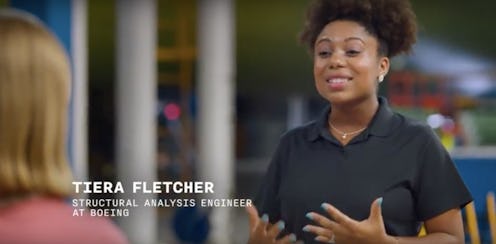Life
This Video Series About Girls Meeting Their Female STEM Heroes Will Make You Tear Up
Be prepared to see a lot of girls meet the female luminaries of STEM. The Advertising Council has teamed up with tech companies and organizations including Google, Microsoft, IBM, General Electric, and Black Girls Code to produce a campaign called She Can STEM, and its first videos are going to make your day. It's aimed at helping girls spark a passion for math, science, engineering, and tech that they maintain through their childhoods all the way to adulthood — and the role models the campaign has on show would inspire anybody, no matter how old.
The videos and posters feature a range of amazing women in STEM, including Google research scientist Maya Gupta, Halo Game Studio Head Bonnie Ross, astronomer Lucianne Walkowicz, and Tiera Fletcher, a structural analysis engineer at Boeing working on space crafts destined for Mars. In some videos, girls have one-on-one chats with their heroes in which the STEM luminaries reveal what they love about their jobs and why.
"It's just like solving a puzzle," Danielle Merfeld, CTO of GE's renewable energy research, tells her interviewer. "Once you've solved it, you get confident, and you like it, and you want to do it again."
Fletcher and others, meanwhile, show groups of middle-school girls around their work environments, from rocket-building to game studios to planetariums, and the cameras capture the girls' budding enthusiasm and flat-out wonder at what they're seeing. It's hard not to get inspired watching through a screen, so the girls on the ground must have come away wanting to become the next Marie Curie.
The campaign couldn't come at a more critical time. Female underrepresentation in STEM remains a continuous issue, particularly when it comes to women of color. A study in 2014 found that women in racial minorities made up less than one percent of physics faculty members across every university and research institution in the United States, and the field remains 75 percent male and 75 percent white, according to data from 2018. The data in other areas of STEM isn't any better; The Atlantic reported in 2016 on a "corrosive culture" that keeps women out of mathematics jobs, and a report in 2017 found that women in general make up only 20 percent of STEM jobs and earn less than their male counterparts.
And women note that one of the key ways in which to keep girls — and adult female scientists — interested and supported in STEM fields is significant role models. A study published in Nature early this month by female geoscientists laid out suggested routes to improving gender equality in STEM, and role models and mentorship featured very high on their list.
For women who want to pursue STEM, role models all through their careers, from supportive teachers to encouraging college tutors and graduate professors, are crucial. They help combat 'boy's club' culture, give solidarity, and provide active support and connections for the technicalities of climbing the ladder. These videos are inspirational, but they also highlight a fundamental truth: STEM inequality is being fought by women helping other women.
The She Can STEM campaign is aimed at fighting sexist ideas about the 'masculinity' of STEM subjects that mean that girls feel less interested or excluded early on. By giving middle schoolers some kick-ass role models, the campaign is hoping to show that STEM definitely is for girls — and that they can dream as big as they like.
